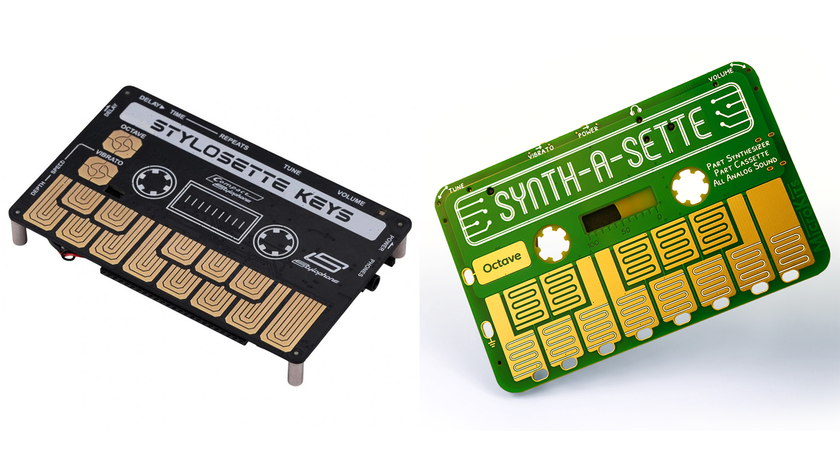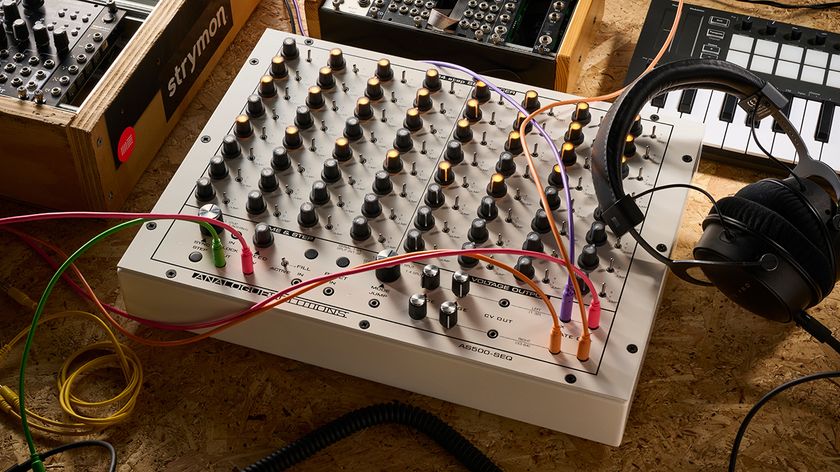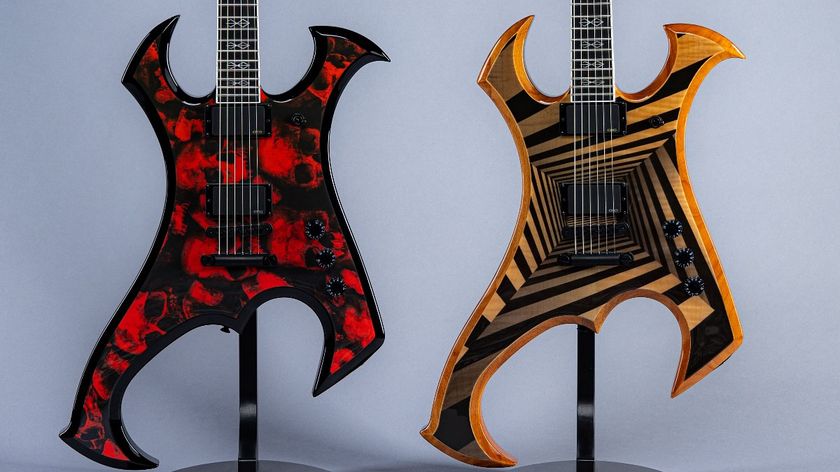How Hauschka fuses prepared piano, modern software and analogue synthesis
Volker Bertelmann shows off his studio and talks composition, recording and production
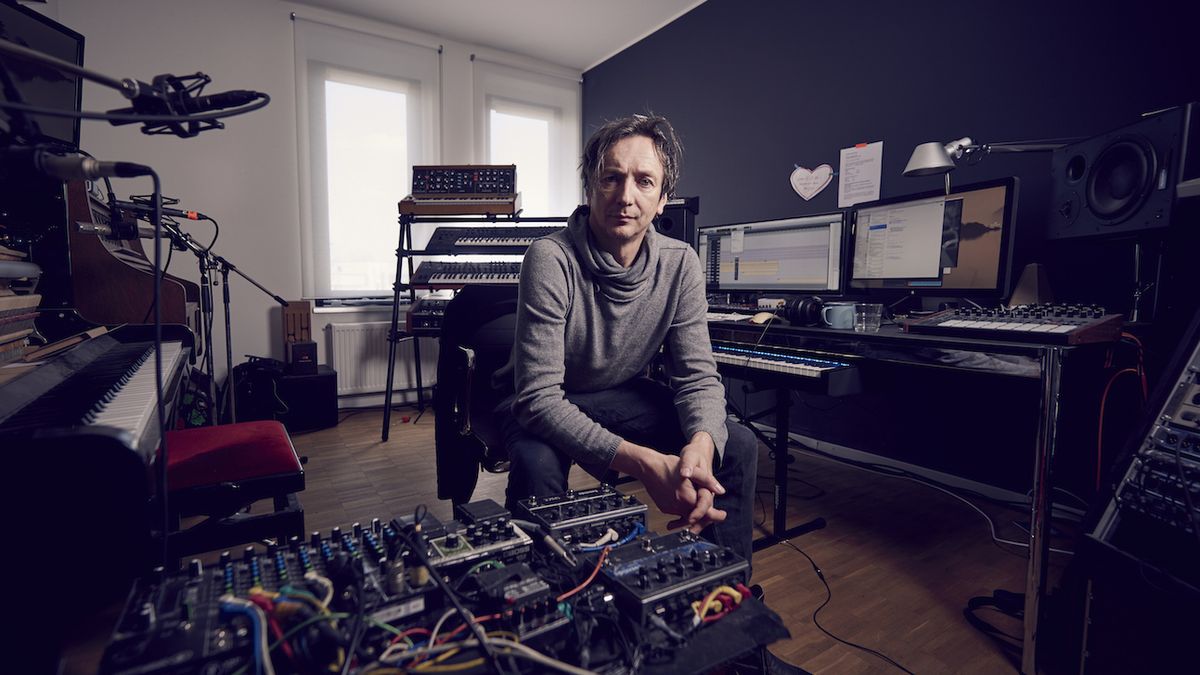
Born in the low mountains of northern Siegerland, Volker Bertelmann (aka Hauschka) began playing piano at eight years old and studied classical piano for a decade. Aged 14, he formed his first rock band before adulthood led him to Cologne to study medicine and economics. But music remained his real passion, and in the early '90s, Bertelmann became a full-time member of the hip-hop duo God’s Favourite Dog.
In 1995, he moved to Düsseldorf and began to draw on his classical training. Substantial (2004) was the first solo work to be released under the Hauschka pseudonym. Soon after, Bertelmann began experimenting with prepared piano using light filters, contact mics and other techniques including wrapping the strings in various materials to create a ‘drum kit’ of tones.
Bertelmann’s acoustic replications went on to create numerous leftfield neo-classical releases, both in collaboration with others and as a film soundtrack composer. He also began putting out electronic music under the alias Tonetraeger. Recently, Bertelmann released his eighth Hauschka album, What If, further exploring the radical abstractions created via prepared piano, modern software and analogue synthesis.
When you began composing your own music, did you need to go through a process of ‘unlearning’ the traditional structures you’d acquired as a classical pianist?
“To be quite honest, that’s totally the case. I’m trying to block the clichéd ways. To avoid the cliché, I try to put obstacles in the way, which I can do with preparations. Most of the music I was doing when I was a kid was with a tape recorder on my knees, playing songs from The Beatles or Queen. So I had to find my own approach without having any notation in front of me. I think that helped me find my own approach to the piano.”
When did you start to contemplate modifying the instrument to suit your own needs?
“I was actually in Wales, in the Brecon Beacons, at a friend’s place called Twin Peaks Studios. I was recording an electronic band project called Music AM, which was a trio. I thought that my piano playing wasn't so far off electronic music, but the purity of the piano meant it didn't sound like electronic music. I needed to change it and influence the sound like a synthesizer does. I tried finding ways to create a hi-hat on a string, so I used paper to get the high frequencies and the hit of a hammer… and there it was! Then I thought that if I prepared the next key as a snare, I'd be creating an analogue sampler in a way [laughs].”
Get the MusicRadar Newsletter
Want all the hottest music and gear news, reviews, deals, features and more, direct to your inbox? Sign up here.
What other techniques have you developed to modify the sounds of the strings? What tricks have you picked up?
“Over the years, I’ve found that light filters are much better because they have a plastic, harder attack. You can actually look at the preparation in a similar way to an ADSR generator by looking at where the attack is, how much sustain the note has, and finding a way of shaping that using various materials. I came at it more from the percussive side. I established a kind of drum kit, bass drum and snare, and now I actually put a contact mic between the hammer and the string for the bass drum, so the hammer hits the contact mic.
“I use an EBow to get long, sustained notes. The nice thing about them is that they do nothing to the tone, but when you press the key you find that you have this pad coming in that sounds like a glass harp. Finding out how these preparations are working allows you to learn different techniques, because you have to play the instrument differently.”
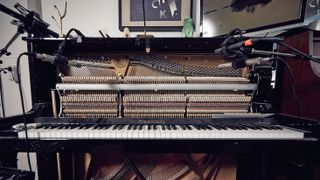
Everyone’s got at least some experience on a piano – how is the playing process different?
“You have to get rid of your normal skills, because certain keys only react when you hit them very hard, and others are too loud. You have to find a way of balancing high-frequency and low-frequency sounds so it sounds like a band. That’s why I need to use a sound guy – to keep the tiger in the cage.”
And on top of everything, you’re also hooked up to a mixer and a lot of kit, which gives you even more scope to tweak the sound of the piano while you’re performing…
“Absolutely! After they see a show, people are thinking, ‘Man, how did you do that?’ But it’s mostly just layers, and the complexity comes from the complexity in sonic variation. I can loop myself, and I’ll find different ways of creating pads with delays, so I can actually extend certain sounds. In a way, it’s a whole DJ production platform.”
You’re also known for not sticking to one piano every time – doesn’t that keep things inconsistent? Or does it keep you on your toes?
“For every piano I’ve played – besides just one in Chicago that was already broken – they all have their strengths and weaknesses. It also depends on the room… if you play in a rock venue and the piano you’re using has an acoustic sound, you have to amplify everything. Sometimes the smaller pianos, like the Yamaha C5, work very well because they have a very controlled, boomy sound.
"But then when it comes to playing in more acoustic spaces, the bigger concert grands and the quality between a Steinway and a Bosendorfer, or a Yamaha C7… it all sounds very different, and you have to create a different way of approaching them. But that’s what I really love, and why I’ll never travel with the same piano all the time.”
What piano do you use in the studio?
“I have to make compromises and can’t change the piano every week, but I’ve recently decided to buy a grand piano, because I’m hoping to move to a bigger space. I’ll actually need it if I’m going to do more film work or to make more records in my home. I also need a bigger space in general, because I have three people working with me now.
"But I would rather put something in a living room of a building and play there than go to a studio with a control room that I always have to run to. At the moment I’m doing both – I’m mixing a lot of my scores myself, and my process is to record everything in a certain way, rather than putting things on tape and EQing them later.”
I’m not somebody who hates the digital sound, but I have different priorities. I’ll use the analogue sound in certain spaces and I sometimes want a controlled piano sound that will always have the same colour
You’re almost taking the acoustic sound into competition with software – are you trying to prove something about digital sounds?
“Plugins and digital piano sounds are getting so much better, and they work very well in pop music, but when it comes to a very solid piano piece with pulls and pushes that slow down and get faster, the whole texture of a real piano is very hard to replace with a sample, and you can tell that straight away.
“For the Lion score that I did with Dustin O’Halloran, we did a couple of layouts with sampled piano using a company called Spitfire in London that makes these awesome textured pianos, but when you go into a studio with your own mics, put felt between the hammers and record with a certain setup in the room, it becomes more about the room, the mics, the mixing board, the atmosphere and the tempo. All of that is what makes a piano take sound different to a sample, because a sample always sounds the same.
“I’m not somebody who hates the digital sound, but I have different priorities. I’ll use the analogue sound in certain spaces and I sometimes want a controlled piano sound that will always have the same colour. A nice example is pizzicato strings – as a sample, they sound much more continuous and solid. Each tone is recorded separately, and that makes them sound very even. It’s funny, because if you write with that sample, when you a let a violin or cello player play it in real time, they can’t actually get the same quality on every note because the bowing makes it nearly impossible.”
Is the approach you have to prepared piano simply about experimentation, or is it more to do with having a completely mastery of the instrument so it becomes an extension of you?
“Actually, it’s much more the latter. It’s the wish to integrate everything that I love into my own music and find ways to prevent the instrument from limiting me.
“There was one key moment when I played at the Roskilde festival a couple of years ago. I played prepared piano with string quartet in a 5000-person tent, which was pretty packed, but next door on the big stage Gogol Bordello was playing the heaviest set ever and we couldn’t hear a bloody thing. We had to adjust ourselves to their key just to make it possible to sound like a good show, and after that I swore to myself that I would find a way to create piano music without any help of synthesisers, so I could play a loud concert where people could stagedive and dance. We changed the whole amplification system, brought in the Helpinstill pickup to boost the bass and make it very full-on. Other pianists started using it when they saw me perform with it.”
There aren’t many artists that have bridged the mainstream/neo-classical gap. What do you think about contemporaries like Max Richter or Ryuichi Sakamoto?
“When I started my first album in 2004, there were people like Max Richter, Jóhann Jóhannsson, Dustin O’Halloran, Sylvain Chauveau and Aphex Twin, who also recorded a prepared piano record. These guys were playing piano music with an independent approach on independent labels. As soon as I found out who those guys were, I got in touch with them and organised a concert series festival in Düsseldorf, because I wanted to hear what they did. We had a very nice time and have stayed in touch. I even did an interview with Max for a magazine where we asked each other questions, and we’ve played shows together on all sorts of occasions. I really love their way of approaching string music and their piano playing, which has a lot of drone elements.
“I’m not so attracted to people that came into the scene about five years later, because a lot of the time they pick up on the romanticism; the guy that is in constant struggle with the world, or girls. What I learned from those guys is that there were all sorts of different approaches, and their focus was always more on the music than themselves. It was not about their personality but what they created, and that’s something that really touched me.”
You described What If as a radical album. Haven’t you been radical enough already?
“I asked myself what I wanted to do next? There is of course the purity of the instrument, which perhaps is not quite so present in my work anymore, so when I step into that I need a different approach.
"Funnily enough, when I was recording the pieces for this record, I also recorded 40 pieces without any preparations. I don’t know when I’ll be ready to release those, but at the moment I feel like I need to balance out the influence that film music has on me – it’s very melodic – and find an approach that’s further left-field, just to give it more of an edge. It’s not to provoke, but to find ways of shaping something and putting my hands into the earth.
“I’m not thinking about hits or commercial appeal, but I want to take the audience on a journey so they can discover through my music things they might find interesting or abstract, and see that there’s a way to combine abstraction, heart and melody. That’s maybe the radical approach in there.”
Is it difficult to transmit concepts without the use of lyrics? How can you be sure that people ‘get it’? Are you happy to leave it open to interpretation?
“Totally. I think it’s more like creating a chain of associations. I have the feeling that no matter how much I explain it, every person will feel differently about it. Starting with the music, if you create a song that you think is beautiful, for somebody else it might be extremely sad.
"When I wrote the album and the nine track titles, which deal with my expectations for the future of the world, I could have made a radical political statement, but that wouldn’t have created a natural flow of thoughts. I’m a big fan of writing the initial idea and then letting people pick out what appeals to them.”
It might just be you on the stage, but there are more pianos that you don’t touch…
“I’m using Yamaha Disklaviers, which have the technology built in. They’re normally made for lounges or bars where there’s no pianist, so you just press a button and the keys are moving by themselves. At the same time, you can play them as a normal instrument and record yourself for playback. So they give you a lot of options and allow you to create this connection between machine and real instruments.
“There are different aspects to it – not just creating electronic music with a musical instrument, but because my hands are limited, these player pianos can play supernatural events, like chords with ten or 15 notes, or they can build layers of sound. The iPad has an Ableton platform, and I can actually send whatever sequence I want to each piano, telling them to play a bass drum, snare or hi-hat, but the quality is acoustic, which mixes much better with my sound.
"On my very first tour, I used prepared piano sounds on a MiniDisc and played with a digital piano. It was totally stupid because the sound was so static that when I finished the set I was very happy it was over. Now it’s so much more fun because it has a live randomness.”
You mentioned Ableton; do you use that in the studio for production?
“No, I’m using Pro Tools and Logic as well. Each one has a different quality. Pro Tools is very film-orientated and definitely an audio platform, but they haven’t made much progress in terms of the MIDI functions. Cubase and Logic are much more orientated to drum rhythms, samplers or virtual instruments.
“I have the feeling that Ableton is much more like a DJ tool – you think more in terms of patterns having different lengths that can be layered, and of course that creates a different approach to your music. With Pro Tools, you can go much deeper into audio, it’s very fast and useful, and the other programs are doing that as well, but Pro Tools has always printed the timecode into the stems, and everything is always in time – communicating with other people is much easier.”

When it comes to effects, have you experienced everything you can do in the box?
“Yes, I use internal plugins. I use a lot of Soundtoys plugins, the whole FabFilter suite, Valhalla reverbs and some of the Eventide plugins are great too. I also have the whole Universal Audio package and Waves plugins.
"Sound quality is no longer a big question – it’s more about the handling and their intuitiveness, because you can get interesting changes when you open and start to play with them. In the whole recording chain, I’ve already incorporated a nice analogue preamp and a Tube Tech compressor, which make the sound very smooth and rich. Then I’m using the effects I need on top of that.”
You recorded a score for the 2015 horror movie The Boy. Was that your first venture into movie soundtracks?
“That wasn’t my first soundtrack but it was my first American movie. I’d made maybe six movies, but The Boy was the most experimental; it included a lot of the stuff I love about my own work – a lot of prepared piano, darkness, and the sound isn’t so melody-driven. Film work is different because it’s collaboration. You have to talk to the director, please the picture and create a soundtrack that has to support the theme of the film.
“I’m totally aware of that and very happy to do it, but I don’t want to lose myself in that process. I want to bring in my ideas to make it an interesting movie, so you have to be very sensitive and flexible, and not put yourself in the focus but step back and wait to hear other people’s ideas and suggestions. Then you go back and try to fulfil that with your own tools, and that makes it very interesting – it keeps me fresh and alive.”
How do you deal with the demands and deadlines placed on you? Can they leave you feeling as though the end product doesn’t meet your usual standards?
“The way you deal with pressure has a lot to do with experience. You look at the timetable and what you have to do, and then you say whether you can do it or if it’s impossible. You need to get the organisational process in place, so you know what time you need for editing, writing the score, recording with a string ensemble or orchestra or outsourcing to a mixing guy to save time. Then you suddenly get three weeks out of six.
"If you lack experience and look at the money and say, oh, that’s more money than I’ve ever earned before and just do it, then in two weeks you might say, ‘Shit, I can’t do this, and that’s creating a lot of turbulence,’ then maybe you get fired.”
So what’s next for Hauschka? And for Volker Bertelmann, for that matter!
“I’m working on three different things simultaneously. First, my live setup for the new album, then a new documentary film about autonomous intelligence; which has its premiere at the Tribeca film festival in New York; and I’m also working on a composition for an Israeli mandolinist called Avi Avital, writing two pieces for mandolin and string quartet.
“My interest in the electronic approach is growing because of my wish to expand in certain areas and blend classical composition with strings and other instruments with my approach to experimental piano music. I’m also thinking of doing hip-hop versions – I already have one track ready with an American rapper that worked with the music on the current album.
“I want to combine these things… but I don’t want it be seem like some obvious crossover project – like Montserrat Cabaret and Freddie Mercury! Who knows if I can do that, but that’s how I want electronic and classical music to sit next to each other.”
What If is out now on Temporary Residence.


Most Popular








